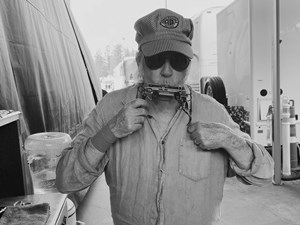New Frontiers: Outback Westerns – Confronting Australia’s Colonial History
Westerns are often considered to be the most American of film genres, inextricably linked to the harsh frontiers of the American West, but did you know the origins of the Western film genre in Australia extend back almost as far as its U.S beginnings? In 1906, just three years after the 12-minute The Great Train Robbery, the first ever hour-long film (considered by some to be the first feature film), The Story of the Kelly Gang – another Western – was made, not in the U.S., but in Australia.
This connection between the traditional US Western and its shared pertinence in Aussie cinema has its origins in the parallel between the nations’ two native people, and their treatment by white settlers – in Australia, the Aboriginal Australians, and in the US, the Native Americans. Often borrowing settings of cattle ranches and vast open landscapes from the US Westerns, the classic Australian Western shares a fondness for tales of pioneering, individualism and daring, as well as the legendary ‘bad boys’, outlaws, and bushrangers. But while the settlers in the American West were there by choice, Britain expelled over 164,000 English and Irish criminals and rebels to Australia. Sometimes referred to as Meat Pie or Kangaroo Westerns, Australian Westerns are usually set in the Australian outback or ‘the bush’. In the place of traditional cowboys and outlaws, they often feature bushrangers – convicts who escaped in the early years of the British settlement of Australia and fled to hide from the authorities in the bush, famously embodied by the outlaw Ned Kelly.
In the 1970s, Australian Western filmmakers, like their American contemporaries, began tackling the issue of frontier racism and romanticised representations of Australia’s colonial past, with films such as Fred Schepisi’s The Chant of Jimmie Blacksmith (1978). Many contemporary titles have focused on re-examining the treatment of Aboriginal Australians, taking the established and predictable tropes, cliches and conventions of the genre and subverting them to raise issues of racism and sexism in Australian history. This revisiting and re-interpreting highlights the Western as a genre that is inextricably linked with brutality and genocide and these bold and subversive films look a far cry different from Ford & Wayne family favourites, in which white male saviours are played off against a savage, Native ‘Other’ – usually played by a white man in make-up.
Central to many of the best contemporary Australian productions is an appreciation for the vast majesty, as well as the latent menace of the Outback. Drawing their dramatic power from the collision of civilisation and wilderness, Aussie Westerns play out fierce human dramas within the natural beauty of Australia’s stark, hypnotic landscapes. One example of which is Warwick Thornton’s Sweet Country, screening as part of our New Frontiers: Outback Westerns double-bill.
Set in Australia’s vast Northern Territory – Sweet Country is a masterful and almost biblically scaled dismantling of the concept of ‘frontier justice’, confronting the bedrock of racism and savagery upon which this concept is predicated. It focuses on an Aboriginal farm worker who shoots a white settler in self-defense, fleeing across the Outback as a posse – including a peaceful preacher – gathers to pursue him. It is far from a simple chase film though, with a solemn, aching quality and a hypnotic grandeur to its setting that accounts honestly for the battle scars of those laying claim to it.
Also playing in our double-bill is an ambitious, urgent, and necessarily shocking female-directed film. With the follow-up to her psychological horror film about grief and motherhood, The Babadook, Jennifer Kent trades in supernatural scares for the deeper and harder-to-shake brutalities of colonial oppression in The Nightingale. Set in 1820s Tasmania, this revenge odyssey tells the story of Irish convict Clare, who flees into rugged forests and mountains from the barbaric lieutenant who slaughtered her family. Far from the arid desert of Australia’s outback, the Tasmanian backdrop is more of a solemn, austere wilderness, once believed to be an inescapable hell by the ‘civilising’ British forces who established penal colonies there, exterminating Indigenous Australians in the process. Clare meets an Aboriginal tracker called Billy, who agrees to guide her north, and it is through this dynamic that the film draws a parallel between Clare’s brutal journey and Billy’s traumatic lifelong oppression at the hands of British soldiers.
Finally, arriving at Showroom on Friday 13th May is another fierce, feminist Australian revenge western. In The Drover’s Wife, Leah Purcell adapts her own play, based on Henry Lawson’s 19th century colonial short story to create an unflinching and relentless frontier thriller, exposing racism and misogyny under colonial rule. With striking parallels to themes explored in both Sweet Country and The Nightingale, Leah Purcell plays Molly Johnson, a pregnant woman left to fend for herself and her family in the Snowy Mountains of New South Wales when her husband leaves to drove sheep in the high country. An escaped Indigenous Australian convict turns up at her ranch, triggering a thrilling tale that reclaims the white-centric narrative of the original story from an Indigenous Australian and female perspective.
Join us at Showroom Cinema this May for our New Frontiers: Outback Westerns double-bill and The Drover’s Wife: The Legend of Molly Johnson, to explore the shocking realities of racism and misogyny on the harsh and untamed frontiers of colonial Australia.
We’re pleased to be hosting a special Reclaim the Frame screening of The Drover’s Wife on Friday 13th May, followed by a live conversation with writer, director and star Leah Purcell dialling in from Melbourne, hosted by Birds Eye View director, Melanie Iredale. Tickets are now on sale.


